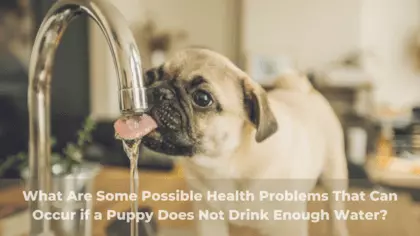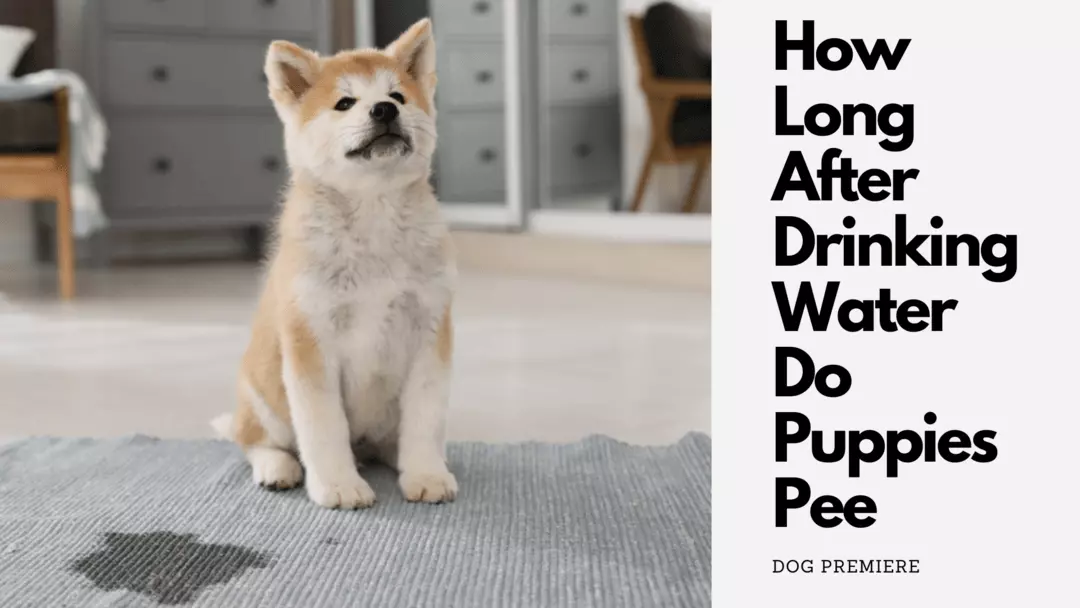It’s important to keep an eye on your puppy’s hydration levels, especially when they’re young. One way to tell if your pup is properly hydrated is by monitoring how often they urinate. So, how long after drinking water do puppies pee?
Puppies typically urinate every one to three hours, depending on their age and activity level. If your pup is drinking a lot of water and urinating more frequently, that’s a good sign that they’re properly hydrated. On the other hand, if they’re not peeing as often, or if their urine is dark yellow or brown, that may be a sign of dehydration.
How Long After Drinking Water Do Puppies Typically Pee?
Puppies need to urinate frequently because their bodies are still growing and developing. If a puppy has been drinking a lot of water, it may need to urinate more frequently. You may be wondering how often they need to relieve themselves.
It turns out that puppies have a relatively high metabolism and they excrete more urine than an adult dog. They also have a smaller bladder, which means they have to go more often.
Most puppies will need to urinate within 30 minutes to an hour after drinking water. Some may need to go a bit sooner, while others may be able to hold it for a bit longer. This will vary depending on the puppy’s age, size, and activity level.
However, if your puppy is taking in a lot of water and not urinating frequently, this could be a sign of a health problem and you should consult your veterinarian.
How Much Water Should Puppies Drink?
Puppies need a lot of water, especially when they are young and growing. Normally, puppies should drink about one ounce of water per pound of body weight each day. So, if your puppy weighs four pounds, he should drink about four ounces of water each day.
However, this is just a general guideline and your puppy may need more or less water depending on a variety of factors, including the weather, his activity level, and his diet. For example, if it’s hot outside, your puppy will need to drink more water to stay hydrated. And if your puppy is very active, he may also need to drink more water than a less active puppy.
The Importance of Hydration for Puppies
Puppies need plenty of hydration to stay healthy as they are born without the ability to regulate their own body temperature or hydration, so it’s important that they receive the proper care to stay healthy.
Dehydration is one of the most common health problems in puppies and can lead to serious consequences if not caught early and treated properly. It can cause a number of health problems in puppies, including kidney disease, gastrointestinal problems, and even death.
Therefore, it’s important to make sure they always have access to fresh water and to monitor their water intake. If you’re going to be away from home for more than a few hours, it’s a good idea to leave a water bottle and bowl for your puppy so they can stay hydrated.
Signs That a Puppy is Not Drinking Enough Water
If your puppy isn’t drinking enough water, it could lead to dehydration, which can be very dangerous. Here are some signs to look for that may indicate your puppy isn’t drinking enough water:
- Becomes lethargic and doesn’t want to play.
- Dry and tacky gums.
- Panting excessively.
- Puppy’s eyes look sunken in.
- The nose can become dry
- The puppy has diarrhea.
- Pale or white gums.
If you notice any of these signs, it’s important to take your puppy to the vet immediately. Dehydration can be deadly, so it’s crucial to get your puppy hydrated as quickly as possible.
What Are Some Possible Health Problems That Can Occur if a Puppy Does Not Drink Enough Water?

It is important for puppies to drink plenty of water to avoid dehydration and other serious health problems. If a puppy does not seem to be drinking enough water, some health problems may occur. Such as:
1. Dehydration
Dehydration is a serious health problem that can occur if a puppy does not drink enough water. Dehydration can lead to medical problems such as kidney failure, seizures, and death.
2. Heatstroke
Heatstroke is another serious health problem that can occur if a puppy does not drink enough water. Heatstroke can occur when a puppy is exposed to high temperatures for an extended period of time. Symptoms of heatstroke include panting, excessive thirst, lethargy, vomiting, and seizures. If a puppy experiences any of these symptoms, it is important to seek medical attention immediately.
3. Gastrointestinal Problems
Gastrointestinal problems can also occur if a puppy does not drink enough water. These problems can include diarrhea, constipation, and vomiting. Gastrointestinal problems can be very serious and can lead to dehydration.
4. Urinary Tract Infections
Urinary tract infections are another possible health problem that can occur if a puppy does not drink enough water. Urinary tract infections can cause a puppy to urinate frequently, have blood in their urine, and experience pain when urinating. If a puppy experiences any of these symptoms, it is important to seek medical attention immediately.
5. Kidney Disease
Kidney disease is a serious health problem that can occur if a puppy does not drink enough water. Kidney disease can lead to kidney failure, which can be fatal.
So, if you have puppies that are less interested to drink water, give her/him water frequently to reduce the health risk. Drinking water properly keeps puppies out of so many health risks.
Tips for Puppies Hydration
As you can’t force a puppy to drink water, you can have a few simple tricks to hydrate your puppies by themselves.
- Add water to your puppy’s food. This will help increase their intake of water.
- Give your puppy small frequent meals throughout the day instead of one large meal. This will help prevent gastrointestinal problems.
- Provide your puppy with plenty of fresh water at all times.
- Make sure your puppy always has access to shade and cool water when outside.
- Take your puppy on frequent breaks when outside in the heat.
- Never leave your puppy in a car or enclosed space in the heat.
By following these tips, your puppy will be hydrated in no time. so, follow these tips to keep your dog hydrated all time.
Frequently Asked Questions
1. How Many Times a Day Should a Puppy Pee?
It depends on a number of factors such as the age of the puppy, their size, whether they are spayed or neutered, and their activity level. However, as a general guideline, most puppies will need to urinate every four to six hours.
2. How Much Water Should Puppies Drink Each Day?
Puppies should drink about 1/2 to 1 ounce of water per pound of body weight per day. For example, a 3-pound puppy would need 1.5 to 3 ounces of water per day.
3. Should Puppies Have Free Water Access?
Yes, puppies should have free water access. Puppies are growing and need plenty of water to stay hydrated. If they don’t have free water access, they may become dehydrated, which can be dangerous.
4. When Should I Take My Puppies’ Water Away?
It is better to take your puppy’s water away about two hours before bedtime. This will help to prevent your puppy from having pees in their crate overnight.
Final Words
Generally, puppies pee after half hour have drunk but it won’t happen if puppies were dehydrated earlier. At that time, you have to give your puppies enough water to drink. It is because puppies need to drink plenty of water to avoid serious health problems.
If you think your puppy is not drinking enough water, it is important to seek medical attention immediately. You can also help prevent dehydration by adding water to your puppy’s food, giving them small frequent meals, and providing them with plenty of fresh water.
So, is that clear how long after drinking water puppies pee? It should be, after reading this blog completely. If you have more queries related to this, feel free to comment below!
